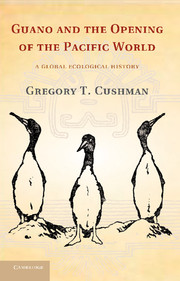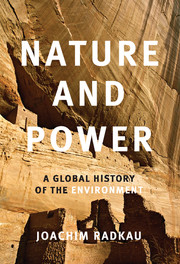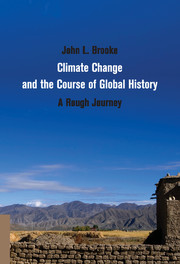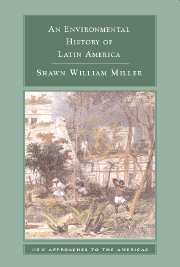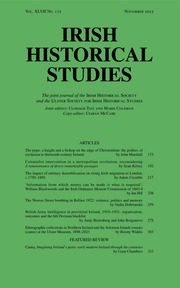Guano and the Opening of the Pacific World
A Global Ecological History
$35.99 (G)
Part of Studies in Environment and History
- Author: Gregory T. Cushman, University of Kansas
- Date Published: January 2014
- availability: Available
- format: Paperback
- isbn: 9781107655966
$
35.99
(G)
Paperback
Other available formats:
Hardback, eBook
Looking for an examination copy?
This title is not currently available for examination. However, if you are interested in the title for your course we can consider offering an examination copy. To register your interest please contact collegesales@cambridge.org providing details of the course you are teaching.
-
For centuries, bird guano has played a pivotal role in the agricultural and economic development of Latin America, East Asia, and Oceania. As their populations ballooned during the Industrial Revolution, North American and European powers came to depend on this unique resource as well, helping them meet their ever-increasing farming needs. This book explores how the production and commodification of guano has shaped the modern Pacific Basin and the world's relationship to the region. Marrying traditional methods of historical analysis with a broad interdisciplinary approach, Gregory T. Cushman casts this once little-known commodity as an engine of Western industrialization, offering new insight into uniquely modern developments such as environmental consciousness and conservation movements; the ascendance of science, technology, and expertise; international relations; and world war.
Read more- Offers a broad and compelling study of how a little-known commodity like guano has influenced the world's relationship to the Pacific Ocean
- Examines the history of imperialism, international relations and other key themes in modern history, detailing how the modern Pacific world came into being
- Successfully integrates the histories of the entire Pacific Basin - Latin America, the United States, East Asia and Oceania - into a single narrative
Awards
- Winner, 2015 Turku Prize, European Society for Environmental History and Rachel Carson Center for Environment and Society
Reviews & endorsements
"Gregory Cushman pursues this thought experiment with utterly magnificent results."
Frederick R. Davis, ScienceSee more reviews"Central themes are clearly articulated in this carefully researched and well-crafted work. These include the importance of the Pacific world to the history of Australia, Japan, and the Americas; the emergence of the modern Pacific world; the "agency of nature" in that process; the link between the Pacific Islands and the Industrial Revolution; the "cultural influence" of resulting transformations; the 'experts' who caused ensuing problems; and ethical consequences. This global ecological study succeeds admirably in detailing the last two hundred years."
R. Scaglion, Choice"Cushman traces multiple overlapping stories - he elaborates a sevenfold argument in the introduction - and his approach offers a pioneering model for future studies whose subjects cannot be contained by traditional conceptual (or physical) boundaries. … [A] provocative example of what global environmental history can be, both broad in its geographical and temporal reach and firmly anchored in local histories and rich archival sources culled from research on several continents. Guano and the Opening of the Pacific World makes a vital contribution to Peruvian historiography, Pacific world studies, and the history of conservation."
Hispanic American Historical Review"Diligently pursuing research in archives, and reading aggressively across disciplines, Cushman has delivered a majestic overview of not just a coastal resource, but of the emergence of the modern world in ecological terms."
Journal of Historical Geography"… scholars everywhere will find this a highly intelligent and provocative book, well worth reading and pondering."
Paul Gootenberg, The Americas"… the book includes some striking stories and challenging observations, and in the end it draws a compelling conclusion."
Sam White, Technology and Culture"This remarkable book covers tremendous ground. Drawing on archival research in three languages over four continents and an enviable command of both the history and science of the environment, Gregory T. Cushman makes a compelling case that guano fundamentally shaped global economic development writ large. This is therefore an important book."
Ariel Ron, Journal of American History"… [an] impressively vast book, which follows guano through time and space and intertwines environmental, social, intellectual, economic and climate histories with the history of colonialism, science, migration and global development … The book is all the more noteworthy as, despite the massive breadth of the book’s subject matter, Cushman remains attentive to the people in this history. The book introduces numerous individuals, from explorers, scientific experts, technocrats and colonial administrators through to the workers who mined the guano, nitrates and phosphates and members of the island nations displaced by the mining. All round, this is one of the most impressive books published in the emerging field of global environmental history."
Jim Clifford, Reviews in History"This is as much an environmental history, as it is the history of environmental thought in the Pacific basin. Cushman is an excellent writer, bringing in a variety of perspectives, from scientists, environmental evangelists, politicians, economists and commodity traders, as well as island populations and bird-watchers, going so far as to imagine the perspective of the guano-producing birds themselves. In the hands of a less-talented writer this might have become quite confusing, but instead the persona (and animal) perspectives help anchor and reinforce the tight knit of humankind’s relationship with its environment."
Juliette Levy, EH.netCustomer reviews
Not yet reviewed
Be the first to review
Review was not posted due to profanity
×Product details
- Date Published: January 2014
- format: Paperback
- isbn: 9781107655966
- length: 416 pages
- dimensions: 228 x 153 x 25 mm
- weight: 0.5kg
- contains: 16 b/w illus. 4 maps
- availability: Available
Table of Contents
List of illustrations
Preface
Abbreviations and acronyms
Prologue
1. Introduction
2. The guano age
3. Neo-ecological imperialism
4. Where is Banaba?
5. Conservation and the technocratic ideal
6. The most valuable birds in the world
7. When the Japanese came to dinner
8. The road to survival
9. Guano and the Blue Revolution
10. Conclusion
Select bibliography
Index.
Interview with Gregory T. Cushman
Sorry, this resource is locked
Please register or sign in to request access. If you are having problems accessing these resources please email lecturers@cambridge.org
Register Sign in» Proceed
You are now leaving the Cambridge University Press website. Your eBook purchase and download will be completed by our partner www.ebooks.com. Please see the permission section of the www.ebooks.com catalogue page for details of the print & copy limits on our eBooks.
Continue ×Are you sure you want to delete your account?
This cannot be undone.
Thank you for your feedback which will help us improve our service.
If you requested a response, we will make sure to get back to you shortly.
×
